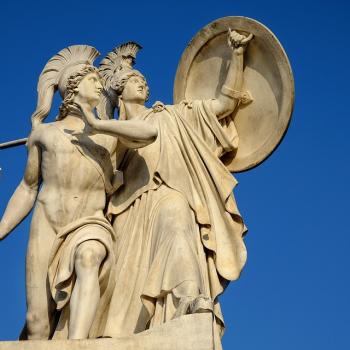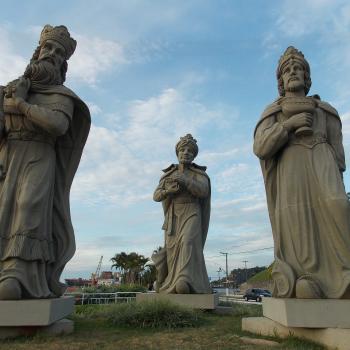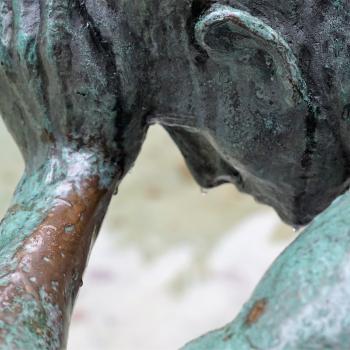Our friend Augustine, trying to understand the Three-in-One God whom we worship, resorted to Source Code material. May Augustine forgive me for using a modern pap movie to talk about his great theological arguments. You needn’t see the movie—it won’t help you understand the Trinity. But sometimes weird ideas pop up in science fiction that can shed light on mysteries. Let me tell you all you need to know about the movie for our purposes:
[spoiler alert]
Jake Gyllenhaal plays an American soldier who went down in a fierce battle in the Middle East. He awakens on a commuter train outside of Chicago, a young woman sitting across from him chatting normally. This, as you can expect, is disorienting. Where is his troop? How did he get here? Why is this woman talking to him as if she knows him?
A series of small incidents take place in the next few minutes: coffee is spilled on his shoe, the conductor asks for his ticket, someone loudly complains, they stop at a station and some get off, etc. We realize that oddness is multiplying when he goes into the bathroom, looks in the mirror, and sees someone else’s face. He isn’t himself. He’s another man. Moments after leaving the bathroom, a bomb explodes on the train and he, with all the others, is killed.
He wakes up in a strange, darkened control room, where a calm voice on a monitor asks him to reconstruct the events. He tries to remember, and is charged with finding the bomb and the person who planted it. And then he is returned to the train, the other man’s body, the conversation, the series of random events. This happens over and over again, until you realize that “the source code” is a memory segment retrieved from the man who died on the train, and has been implanted in Jake’s head.
As if that isn’t science fiction-y enough for you, the embedding of Jake’s identity in the other man’s memory actually changes the course of events, and he comes out of the movie as the other man.
Marginally satisfying, as far as pop science fiction movies go.
But let’s look at what the movie gives us as tools for understanding Augustine’s argument. Augustine goes back to the source code of our identity.
“Let us make the human being to our image and likeness” (Gen. 1.26).
This is the imago dei, the image of God that we bear. Whether or not evolution is true, we are something unique in the created order. Peter Singer, a professor of bioethics at Princeton, calls this “specieism,” a nasty and unwarranted belief that some animal species (humans) have a greater moral value than other species. Singer would have us believe that a South American Redbelly Toad and a human being are just two forms of life, equally valuable and worthy of “rights.”
Augustine would whack him upside the head. Does not our Lord himself tell us that we are worth more than many sparrows? (Sheesh, let alone toads.) God values the toads and the sparrows, but he treasures us. Why? How do we know this? Because of the imago dei.
The imago dei is our “source code.”
Now Augustine is quick to realize that this might suggest that we are mini-gods, itty-bitty divinities, chips off the old block as it were, and he rejects this simple comparison out of hand. Anatolios describes it thus: “Augustine immediately proceeds to clarify that humanity’s status as ‘image’ indicates not parity or some kind of reduplication in miniature of the divine being, but rather humanity’s dynamic of relatedness to God through imitation.”
Imitation, not reduplication. The imago dei is expressed in imitation. And how do we imitate God?
Augustine suggest three ways by which we are empowered to imitate God:
in remembering
in understanding
in loving
These three activities of the soul—functions of memory, intellect, and will—echo the activities of God.
When Augustine addresses the issue of memory, he is not talking about the scrapbooks that are our brains. He is talking about our ability to be aware, conscious. All that we are draws on memory; everything that I am expresses all that I have known, experienced, been taught, read, observed. I am puny and limited, and thus my memory is selective, weak, and partial; my mind is trapped within the boundaries of my own lifetime, my own experiences or education. God, however, has known all and has been present to all, thus God is perfectly conscious. To him, Abraham, Isaac, and Jacob are alive—that is, God has no limits of time or space. No boundaries, no boxes.
When Augustine addresses the issue of intellect, he is not talking about “smarts.” As though smarter people know God better than not-so-smart people. He is talking about our ability to know ourselves, to know others, to orient ourselves in the contexts of our lives, and to extend our knowledge of our selves into the world. I can only do this partially, in fragments as it were, because I am broken and my self-knowledge is incomplete and clouded by untruths and darkened by sin. God, however, knows the fullness of himself without shadows or hiddenness and, as the Center of all things, perfectly orients himself and extends the knowledge of his self into the world.
When Augustine addresses the issue of will, he is not talking about freedom of choice, as though God presents himself with alternatives and picks between them. He is talking about the whole desire of the self to offer this self-awareness and self-knowledge in love. I can only do this partially, because my weaknesses and brokenness has invaded my will and I am a feeble lover. God, however, who lacks nothing and is fully complete in himself, can offer himself freely, wholly, without fear.
Augustine writes thus about discovering this Trinitarian imprint on the human soul:
Anyone who has a lively intuition of these three (as divinely established in the nature of his mind) and of how great a thing it is that his mind has that by which even the eternal and unchanging nature can be recalled, beheld, and desired—it is recalled by memory, beheld by intelligence, embraced by love—has thereby found the image of that supreme trinity.
“…his mind has that by which even the eternal and unchanging nature can be recalled, beheld, and desired…” I have the “source code” for the image of the Trinity within myself.
Now some have complained that Augustine’s reflections on the triune image in the soul have led to an unbridled individualism, a narcissistic obsession with the “me” that reflects the divine. But as Augustine pulls all these thoughts together, he reiterates the trajectory of this image; that is, he points out that these three functions of the soul are not imago dei in any sense except insofar as they are directed toward God. I see the Triune imprint in my soul when I become aware, know my awareness, and extend that awareness toward God. This internal design only functions as a sign of the Trinity when it is pointing toward, yearning for, thirsting after God.
Thus, when we “actualize” the Triune image through “referring” ourselves to God, we are “being renewed for the recognition of God according to the image of him who created him” (Col. 3.10).
Now just think this through a bit… If, as we have argued, a) we are created in the image of God; and b) that image is clouded and broken; and c) it finds its wholeness when it is turned toward God in love and longing; then d) we will only know ourselves in truth and be healed at all the levels of our being when we are in the path of seeking and loving God.
Anatolios writes: “The full integrity of the image will only be manifest when the mind’s self-knowledge is fully integrated into its knowing of God and its self-love is fully enfolded in its love of God. … Because the realities that are the objects of faith are beyond human understanding, the dialectic of faith and sight/reason is performed in the mode of quest.” (italics added)
Mulhern thinks this means: “I am made in and for the image of God. I’m screwed up. Restoring that image is not going to happen through any of the ways I’m likely to attempt: good manners, more degrees, voting correctly, being able to name the twelve tribes of Israel, getting teaching accolades, having a model home, raising charming children (though I must say … I mean, if you know Hilary and Riley … oh pshaw, blush), getting the Best Wife Award, writing a best-seller that is made into a movie and thus becoming the next J.K. Rowling while going from obscurity into fame and glory and being unbelievably humble about the whole thing. (Oops, getting a little distracted here.) Right. Restoring that image, recovering the true identity of myself means the ongoing pursuit of God. Not getting the right answers; plugging in the right theological doctrines and formula; or pinning down God and making him account for all the mysteries that so plague me. Bearing the suffering of not knowing or understanding, but all the while trusting, longing, thirsting, in a dry and weary land where there is no water. The mode of quest.”
“The project of knowing God involves a finding that keeps on seeking.” (Anatolios)
Now let’s go back to the movie Source Code. As Jake remembers—over and over again—he actually becomes someone new, someone who makes a new choice and a new life through loving another person. His memory becomes the source of his will and identity, and is then realized in love and new life.
Yes, yes, I know, science fiction. Augustine would roll over in his grave. But like I said, I’m puny and need puny “hooks” for understanding this stuff. At the very least, it kindles my imagination and makes me want to know more about the really Real, the source code of God that lifts my chin, like a mother, and says, “Look me in the eyes.”
___________________________
Note to Reader: This series on Trinitarian Spirituality explores the history and spirituality behind the shaping of the Nicene Creed using Khaled Anatolios’ Retrieving Nicaea: The Development and Meaning of Trinitarian Doctrine (Grand Rapids, MI: Baker Academic, 2011) as guide and inspiration. It’s best to begin at the beginning: An Introduction.














